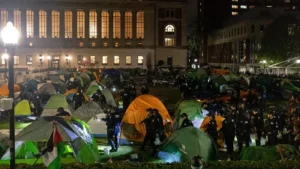Why academic scholarship on Israel and Palestine threatens western elites

NYPD police officers in riot gear descend on a pro-Palestinian student encampment in front of Hamilton Hall at Columbia University in New York City on 30 April 2024
Joseph Massad writes in Middle East Eye on 18 June 2024:
Since the 1980s, there has been a growing gap in the principal western countries between academic knowledge and the mainstream media when it comes to the Middle East, especially on the topic of Palestine and Israel. The gap is most apparent in the United States, but also in Britain and France.
Between the early 1950s and late 1970s, academic knowledge and media coverage of this issue had largely converged in their support for the Zionist state. Israel’s crimes against the colonised Palestinians were often suppressed or even justified.
There were some exceptions, of course, like journalist David Hirst’s 1977 classic The Gun and the Olive Branch. Released by a mainstream commercial publisher, the book made the previously little-known histories of the Palestinian struggle and Zionist settler-colonialism accessible to a broader audience.However, it was not until the 1980s that the momentous academic production on the subject of Israel and Palestine occurred.
Edward Said’s The Question of Palestine in 1979 and Noam Chomsky’s The Fateful Triangle in 1983 were early doses of what the new academic scholarship on Palestine and Israel portended and had reached larger audiences on account of the fame of their authors. While neither Said nor Chomsky was a Middle East specialist, both were distinguished academics in their respective fields of comparative literature and linguistics.
Since then, the shift in the field from its erstwhile pro-Israel position to more critical scholarship has created a wide chasm between the academy and the media.
A critical shift
Before the 1980s, attempts by Palestinian scholars in the West to provide alternative histories remained limited in scope, especially in view of the pro-Israel euphoria that overtook the right and the left after the 1967 Israeli conquest of three Arab countries. Examples include the most valuable books of historian Abdul Latif Tibawi, who published between the late 1950s and late 1970s, and other studies by Sami Hadawi and Fayez Sayegh.
Other scholarship includes the crucial documentary history edited by Walid Khalidi, From Haven to Conquest, and Ibrahim Abu-Lughod’s edited The Transformation of Palestine. Both books were published in 1971 but remained ghettoised within a small circle of Arab and Palestinian readers in the West and their small circle of supporters. This was also the case with Sabri Jiryis’s definitive 1976 book The Arabs in Israel, which detailed the apartheid system under which Palestinian citizens of Israel suffered.
The 1982 Israeli invasion of Lebanon, in which slaughtered Palestinian and Lebanese civilians received rare western news coverage, also allowed for more academic production that was critical of Israel.
